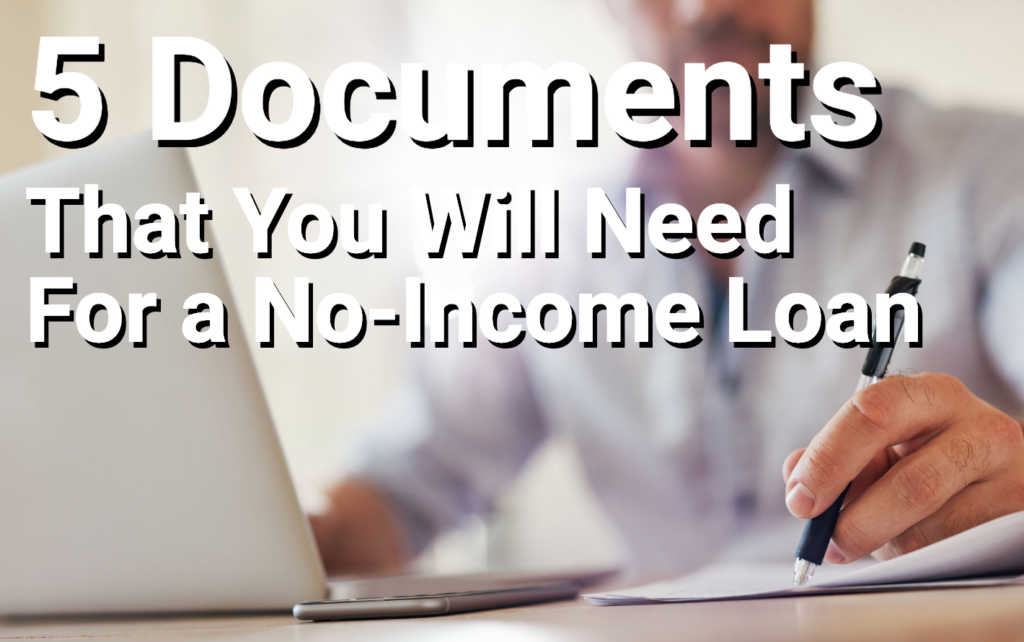Our no-income loans for investment properties are a great way to complete a purchase when traditional methods won’t work. For many investors, including self-employed and commission-based professionals, the use of pay stubs, bank statements, and tax return may not result in easy approval of the loan. In these situations, borrowers need a different approval method for their investment-property loans.
With our no-income loans, you can get the financing you need without traditional income documentation.
While you can get a loan without traditional income information, there are certain documents you will need. If you are using a no-income loan for your investment property, here are a few of the documents that you’ll want to bring to the lender’s office.
5 Documents You Will Need for No-Income Loans on Investment Properties
1. Statement of Future Rental Income
Part of the application process will include an analysis of the future rental income brought from the property. Essentially, you need an accurate description of the monthly rent, which will then be used towards qualification. This number is calculated through a detailed analysis of the property. If the property has already been rented, you can use documents that show how much is brought in every month. You may, in certain situations, need to hire a professional to perform a complete survey with a market analysis and review of the property to obtain an accurate number.
Why it’s Important:
This information will help determine how the qualification is determined. If the rent equals 1.1% or more of the total payment, the loan can be qualified using future rent as income. This allows all other debts to be ignored, enhancing the chances of approval. If the rent is less than 1.1% of the total payment, there is a secondary option that will not require income documentation but will come with a slightly higher interest rate.
2. Proof of Reserve Requirements
With this loan program, you will need to prove you have finances that will cover at least six months of mortgage payments. Called “reserves,” or “cash reserves,” you will need to bring statements from your savings, checking, or even retirement accounts that demonstrate you have this financial cushion. Six months is a small number compared to most jumbo loans, which sometimes require reserves for as much as two years worth of mortgage payments.
Why it’s Important:
Proof of reserves is important because it helps reduce risk to the lender, thereby increasing your approval chances. Lenders like to see that if a financial crisis occurs, such as the loss of a job or the closing of a business, you will still be able to make the payments until your get back on your feet. With cash reserves (and proof), you will likely get better terms and increased chances of approval.
3. Information on Currently-Owned Properties

The no-income program will also require that you bring information on all the properties on which you currently have mortgages. Before visiting the lender, compile all information related to your mortgages, including monthly payment, total balance, and remaining timeframe on the loan. You may have to contact multiple lenders to gather this information if you have loans with a variety of institutions.
Why it’s Important:
This loan program allows you to get financing on a loan even if you have up to 20 financed properties. This is a rather lenient aspect for the program, as other loans may reject your application if you have 20 financed properties. Some may even reject the loan if you have half of that amount. Lenders want this information because it can help them analyze the total financial risk of making the loan; statistically, if you have more properties, your chances of default are increased, but this loan can essentially overlook that risk.
4. Documentation of Assets
This is related to the cash-reserve requirements. To increase your chances of approval, as well as affordable terms on the loan, bring documentation of ownership for all the financially-significant items you own. This can include investment accounts, 401(k) accounts, expensive equipment, and other real estate properties that you own outright.
Why it’s Important:
Having assets makes you a more appealing applicant, as the lender can see that 1) you are financially stable and able to own multiple types of property and 2) that in the event of a financial issue, you have property that can be liquidated to help make the payments. Depending on the nature of the no-income loan, bringing proof of non-liquid assets could increase your chances of approval and bring a lower interest rate.
5. LLC Information (If Closing Loan as LLC)
An LLC is a great way to structure an investment purchase, but to close the loan with this strategy you will need to bring a variety of information to the lender’s office. You may need to bring information related to the company’s credit, and demonstrate collateral that is owned by the company. You may also have to speak to the lender about the nature and structure of the business, as well as the sources of income.
Why it’s Important:
Using a Limited Liability Company to close your loan brings certain advantages to the real-estate investor. Because the property is held under the business, any lawsuits related to the property (such as a slip and fall on the front porch) can’t be tied to your personal assets. So if a tenant hurts themselves and sues for compensation, they can’t go after your home, vehicle, or personal savings. A personal guarantee will be required for approval, but this is still a useful strategy for many investors.
Helping Enhance Your Financial Future with No-Income Investment-Property Loans
With flexible terms and the chance to purchase a wide variety of properties, our no-income loans may be the right option for your next investment purchase.
Contact our experienced staff to see if this program could help you get approved for a no-income loan on an investment property.


